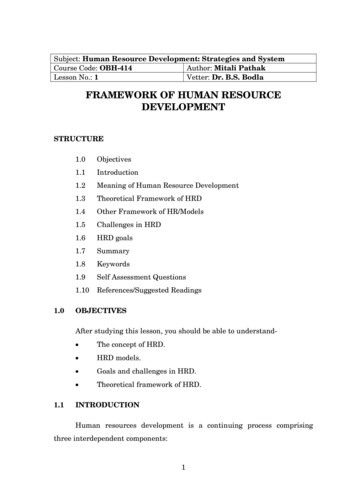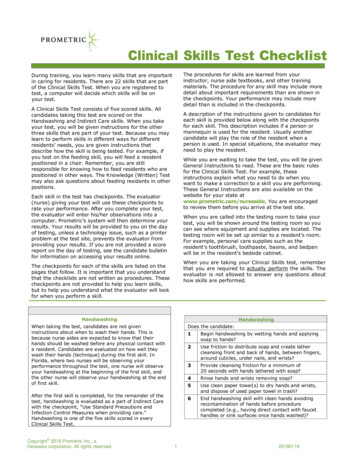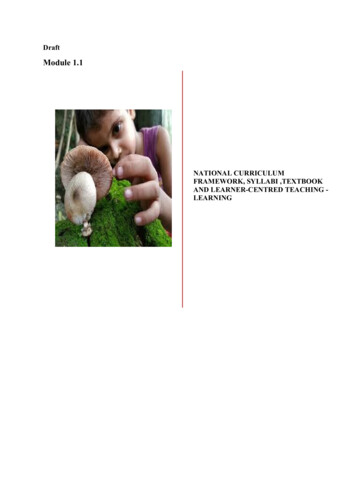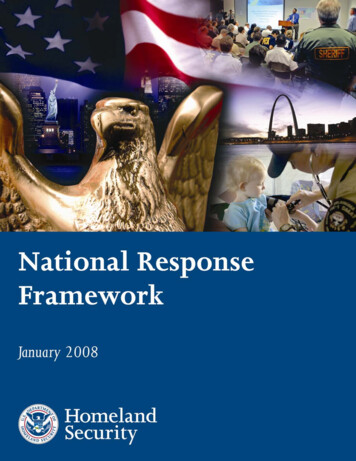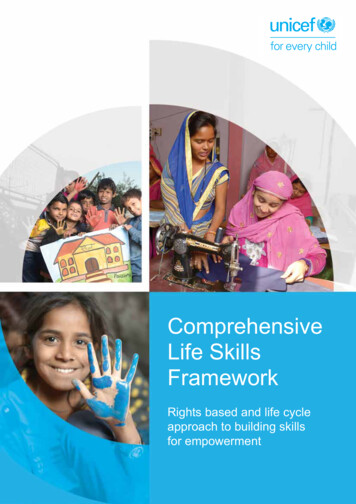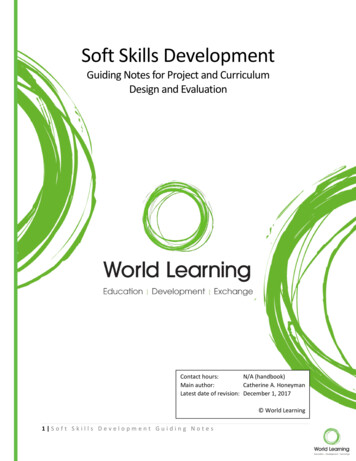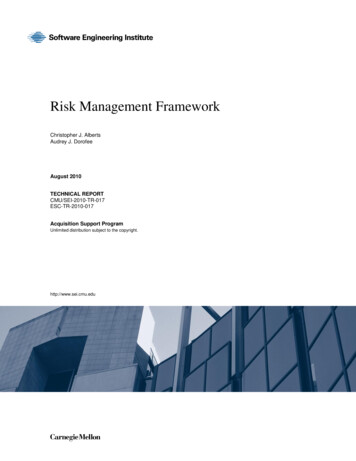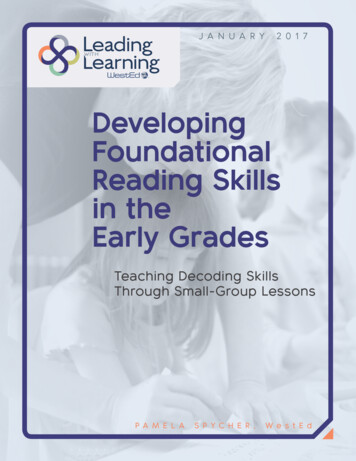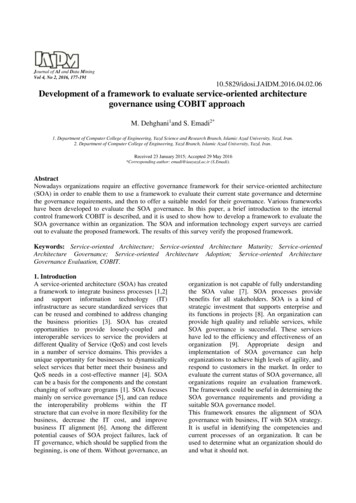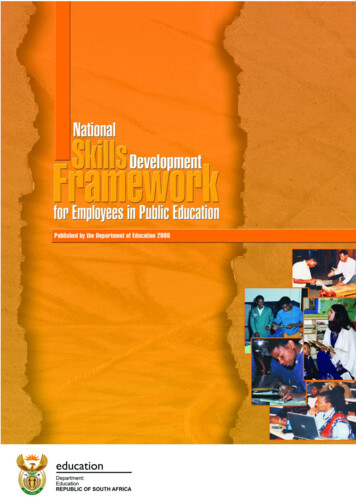
Transcription
Department of EducationSol Plaatje House123 Schoeman StreetPretoriaSouth Africa0002Private Bag X895Pretoria0001Tel: 27 12 312 5911Fax: 27 12 321 6770www.education.gov.za Department of EducationThis publication is an internal document of the Department of Education. It may be used in partor as a whole, provided that the Department of Education is acknowledged as the source ofinformation.ISBN:Design and layout: Formeset Digital, Tshwane, (012) 324 0607Printed by Formeset Printers Cape
Table of ContentsForeword.11.Introduction and background.22.Purpose.23.Policy environment.34.Scope of applicability.45.Status of the Sector.46.Challenges faced in relation to skills development.67.Priorities of the Sector.78.Department of Education process/cycle of skills development.89.Resources.1010.Roles and responsibilities.1011.Conclusion.14List of Acronyms.15Contact details.16Acknowledgements.19
Foreword by the Director-GeneralIt gives me great pleasure to publish this National Skills Development Frameworkwhich will facilitate the provision of the skills base required for the achievement of thestrategic objectives of Department of Education. The National Skills DevelopmentFramework targets the development of all employees and future employees in publiceducation. This Framework is borne out of a concerted effort by all the relevantrole-players to ensure that we deliver efficiently and effectively on our objective toimprove the quality of education.This publication would not have been possible without the contribution of officials ofthe Provincial Departments of Education and the ETDP SETA. We remain profoundlyindebted to other partners in the education, training and development sector,whose ongoing support and recommendations will provide the basis for the furtherdevelopment and improvement of our educators and employees.As a key player in supplying skills and competencies to the country the Department ofEducation is facing up to the challenge of responding to Provincial Growth andDevelopment Strategies and to contribute to the Accelerated and Shared GrowthInitiative for South Africa (ASGISA).Duncan HindleDirector-General1
National Skills Development Framework1.Introduction and backgroundThe aim of the National Skills Development Framework is to facilitate, monitorand coordinate Skills Development activities within the Department of Education.For purposes of this National Skills Development Framework, we define thenational Department of Education and the nine Provincial Departments ofEducation as the Department of Education.In terms of this Framework, skills development refers to education, training anddevelopment activities designed to help employees and future employees gainknowledge, skills and attitudes that would improve their performance in thepositions that they currently hold and improve their future prospects.In the past, the Department of Education conducted training and skillsdevelopment in the absence of a coordinated and coherent National SkillsDevelopment Framework. This resulted in a fragmented, uncoordinated, andhaphazard approach to skills development interventions. This National SkillsDevelopment Framework intends to address this problem. The Framework wasdeveloped in collaboration with the relevant stakeholders.2.PurposeThe purpose of this framework is to facilitate the provision of the skills base thatis required for the achievement of the Departments' strategic objectives and thedevelopment of all employees and future employees.In cognisance of the provisions of the relevant policy directives, this Frameworkis geared towards:2
Inculcating a spirit of lifelong learning among employees of the Departmentof Education. Ensuring equitable access to and participation in properly structurededucation, training, and development interventions that will lead to theacquisition of competencies that will enable employees and futureemployees of the Department to enhance their job or work performance,thus resulting in improved service delivery. Providing specific guidelines with respect to skills developmentprogrammes and initiatives that the Department will implement. Linking strategic Departmental education, training, and developmentinitiatives with National Skills Development Strategy outcomes. Providing for a standardised approach to the implementation of skillsdevelopment programmes within the Department. Ensuring that the Departments budget spend at least a minimum of onepercent (1%) of their personnel payrolls for skills development. Monitoring and evaluating the implementation of skills development inDepartments.3.Policy environmentThe Skills Development Framework is guided by the fact that the South Africanworkforce, in this case all employees within the education training anddevelopment sector, need relevant and competitive skills. These are required inorder for them to develop as individuals, to add value to the performance of theorganisation, and for them to contribute meaningfully to the development of theSouth African economy. The following policies and legislative frameworks are inplace to help ensure that these goals are realised: Skills Development Act of 1998 Employment Equity Act of 1998 Skills Development Levy Act of 1999 Labour Relations Act of 19953
4. Public Service Act of 1994 Employment of Educators Act 1998 National Skills Development Strategy (NSDS 2005-2010) National HRD Strategy for South Africa 2001 Integrated Quality Management System 2003 National Framework for Teacher Education (Draft)Scope of applicabilityThis Framework applies to all areas of skills development within the Departmentof Education. The Framework provides for a focus on the following categories ofemployees and future employees within the Departments of Education:5. Institution-based educators Office-based educators Public servants (all levels) Applicants and potential applicants for Departmental postsStatus of the SectorAccording to the Sector Skills Plan developed by the Education, Training andDevelopment Practices Sector Education and Training Authority (ETDP SETA) in2004, there are 56 754 institutions in the Education, Training and Development(ETD) Sector. These institutions employ an estimated 656 068 people, and theDepartment of Education's headquarters and provincial offices employ a further10% of all the employees in the sector. In relation to total employment (10.5million people employed in the formal sector of the economy), this sub sector ofthe South African economy employs six percent (6%) of all employees in SouthAfrica. Furthermore, the ETD sector provides job opportunities to a third of allemployees in the community, social and personal services sector.Almost a fifth (17%) of all employees in the sector hold managerial positions.4
The rest of the sector is composed mainly of educators (70%), while 5%are administrative staff and 8% are support staff. The demographic profile ofemployees in public ETD sector – particularly that of teaching staff membersreflects the national distribution in general: 78% of employees are African, 11%are White, eight percent (8%) are Coloured, and three percent (3%) are Indian.Men are under represented in the Education Training and Development sector ingeneral, with only a third of all employees being male.State expenditure on education, which covers staff salaries, administration,infrastructure, learning support materials and other expenses, providesan indication of the size of the education sector as a whole. For instance,consolidated education spending consumed, on average, approximately 25% ofnon-interest expenditure over the period 2001/02 to 2004/05, while its share ofGDP averaged 5.5% over the same period.The Technical Committee on the revision of the Norms and Standards forEducators (1998) defines the subfields as follows: Early Childhood Development (ECD) Schooling (including general and further education and programmes) Adult learning or Adult Basic Education and Training (ABET) Higher Education and Training (HET) Workplace educationProviding education, training, and development in rural areas has beenneglected over a long period. This has created specific challenges that demandthat greater attention be given to building and strengthening provision in ruralareas, particularly in the areas of ECD and ABET that rely on non-formal ETD.The Norms and Standards have lifted the minimum qualification requirements forall new teachers to REQV 14, that is matric and four years study. This means thateducators in the system who have a REQV 13 level will be considered qualified,but all new educators joining the teaching profession will be required to obtain5
the minimum of a REQV 14 qualification. In 2001, 18% of educators had less thana REQV 13 qualification. Seventeen percent (17%) of educators at public FETcolleges have qualifications equivalent to REQV 12, which means that they arealso under-qualified.6.Challenges faced in relation to skills developmentThe Skills Development Act of 1998 includes various challenges in relation toskills development. To meet their strategic objectives, the Department ofEducation must invest in human resources, focussing on the following areas:6.1To identify and address areas demanding development in order to achievegreater competence in the workplace, relevance and alignment to strategicobjectives.6.2To provide the required skills, the Education and Training sector skills planin conjunction with the Workplace Skills Plan (WSP), among others, will beused.6.3The Department of Education will also need to identify supply led and notdemand led programmes6.4The Department of Education needs to undertake ongoing research toidentify scarce and critical skills that are required by the sector.7.Priorities of the SectorWithin the broader goal of achieving Quality Education for All and in support ofthe NSDS (2005–2010), the broad priorities of the Department of Education forthe next five are as follows:6
7.1DoE Strategic Plan (2005–2009)7.1.1Infrastructure development7.1.2Restoring the professional integrity and status of teachers7.1.3Skills development through the revitalisation of FET Colleges7.1.4Adult Basic Education and Training7.1.5Monitoring and evaluation7.1.6Institutional reform7.1.7Dealing with poverty, and improving social cohesion7.1.8Learning from International developments in education7
8.Department of Education process/cycle of skills developent2CONSULTATION(Consulting with all stakeholders)SUMMARISE and SETPRIORITIES (WSP) & submitCOSTED RECOMMENDATIONSON SKILLS DEVELOPMENT TOProvincial Skills DevelopmentCommittee (SDC)3APPROVAL1Submission of Department ofEducation WSP's by SDC to nineHOD's & DG for APPROVALSKILLS AUDITPMDS, PMDS of SMS members,IQMS etc.andCompile skills audit(Developmental needs/determineskills needs): PMDS, IQMS etc.4IMPLEMENTATIONof approved WSP's5REPORTINGAnnual Training Reports &Budgets, to be submitted toETDP SETA & nDoE8
Education, Training and DevelopmentMonitoring implementation (WSP)1 April31 MarchDepartment of Education Business Process of Skills Development and timelinesBusiness Cycle1.TimelineSkills Audit: Collection of personal developmentalAprilplans rom IQMS, PMDS, PMDS for SMS members,(1st Quarter of the financialPMDS for Public Service Employees to determineyear)the respective skills needs.2.Consultation: Consolidate (Meeting with all stake-Aprilholders), summarise and set priorities (WSP) &(1st Quarter of the evelopment to Provincial Skills DevelopmentCommittee (SDC)3.Approval: Submission of PED's WSP's to nineBy end of MayHOD's & DG for approval.(1st Quarter of the financialyear)4.Submit PED's and Staffing Services WSP's toBy 30 JuneETDP SETA and nDoEg5.Implementation of approved WSP's.July–March6.Submit quarterly reports to ETDP SETA and nDoEFrom end of 2nd FinancialQuarter to end of 4thFinancial Quarter7.Monitoring, evaluation and reporting on preparation1 April–31 Marchand the implementation of the WSP9
9.ResourcesThe following resources are required for effective service delivery.Human Resources:Dedicated skills development units in the Department, which reach into allsectors of government and organisations.Financial Resources:In terms of the Skills Development Act, Departments must budget and spendat least 90% of the 1% of their personnel payrolls for education, training, anddevelopment. These skills development budgets must be ring-fenced and betreated as separate line items in financial reporting.10. Roles and responsibilities10.1 The role of the National Department of Education is to:10.1.1standardise skills development esbycollectinginformation, supporting, monitoring and reporting to all relevantforums and stakeholders;10.1.3monitor implementation of skills entlyindeveloping and implementing their Workplace Skills Plans10
and ensuring that the IQMS and PMDS are integrated in theimplementation of education, training, and development initiatives;10.1.5evaluate skills development initiatives over a five-year cycle byassessing them against Strategic Objectives;10.1.6facilitate general communication, and share information onprinciples of good practices, and on skills development legislationwith Departments of Education in consultation with the ETDPSETA;10.1.7consolidate a skills development quarterly report that reflects thesituation at national level.10.2 Provincial Departments of Education10.2.1Constitute a Skills Development Committee (SDC) representativeof all relevant stakeholders.10.2.2Develop WSPs and ATRs in consultation with the SkillsDevelopment Committee (SDC).10.2.3Budget a minimum of 1% of the personnel payroll for skillsdevelopment purposes.10.2.4Implement the WSP.10.2.5Provide quarterly reports.10.3 Labour Unions10.3.1Participate in Skills Development Committee.11
10.3.2Facilitate participation of workers in all relevant skills developmentactivities.10.4 Department of Education Skills Development CommitteesThe role of the Committees will be to:10.4.1guide the direction of training to ensure the integrated attainmentfocused capacity-building through training and development, is inaccordance with the National Framework for Teacher Education(NFTE);10.4.2ensure that the WSP reflects the skills needs from the IQMS,PMDS, PMDS for SMS members and PMDS for Public Servants;10.4.3guide the allocation of the education, training and developmentbudget in line with the skills development priorities of theDepartment of Education; and10.4.4ensure that all training initiatives comply with quality assurancerequirements as set out by Skills Development legislation.10.5 Skills Development FacilitatorThe task of the Skills Development Facilitator will be to take responsibilityfor:10.5.1facilitating the establishment and functioning of the skillsdevelopment committee;12
10.5.2compiling and facilitating the implementation of the WorkplaceSkills Plan;10.5.3implementing of the agreed upon Work Place Skills Plan; and10.5.4submitting the Annual Training Report (ATR) to the ETDP SETAand the DoE.10.6 ETDP SETAETDP SETA is responsible for assisting in the development, approvaland implementation of sector skills plans, establishing and promotinglearnerships, and undertaking research into the sector's skills profile.10.7 Skills Development Task TeamA Skills Development Task Team (SDTT) will be established consisting ofthe National Human Resource Development Directorate, TeacherDevelopment and Staffing Services Directorates, provincial representatives(HRD or Skills Development), a representative from ETDP SETA and onerepresentative per teacher union. It will:10.7.1monitor the implementation and impact of skills developmentinterventions in respect of public education; and10.7.2share information and information on best practice, support andguide the ETDP SETA in the achievement of its mandate.13
11. ConclusionThis Framework is an internal policy document agreed to by the Department ofEducation. It presents the internal activities in response to the Skills DevelopmentAct of 1998 as amended and the related statutory bodies such as the Education,Training and Development Practices Sector Education and Training Authority(ETDP SETA).14
List of AcronymsABETAdult Basic Education and TrainingAIDSAcquired immunodeficiency SyndromeASGISAAccelerated and Shared Growth Initiative for South AfricaATRsAnnual Training ReportsDGDirector-GeneralDoEDepartment of EducationECDEarly Childhood DevelopmentETDEducation, Training and DevelopmentETDP SETAEducation, Training and Development Practices: SectorEducation and Training AuthorityFETFurther Education TrainingGDPGross Development ProductHETHigher Education and TrainingHEDCOMHeads of Education Department CommitteeHIVHuman Immuno VirusHODHead of DepartmentHRDHuman Resources DevelopmentIQMSIntegrated Quality Management SystemNFTENational Framework for Teacher EducationNHRDNational Human Resource DevelopmentNCSNational Curriculum StatementNSDFNational Skills Development FrameworkNSDSNational Skills Development StrategyOBEOutcomes-based EducationPMDSPerformance Management Development SystemREQVRelative Education Qualification ValueSDCSkills Development CommitteeSDTTThe Skills Development Task TeamSMSSenior Management ServiceWSPWorkplace Skills Plan15
Contact details Skills Development FacilitatorsAdditional information, clarity or general information in relation to the National SkillsDevelopment Framework (NSDF) or related information may be requested from thefollowing Skills Development Facilitators:16Eastern Cape Department of EducationNorthern Cape Department of EducationMs Bulelwa LusaseniMr. Xolile JackPrivate Bag X 0032Private Bag X 5029BishoKimberly56058300E-mail: bulelwa.lusaseni@edu.ecprov.gov.zaE-mail: xJack@per.ncape.gov.zaTel: (040) 608 4650Tel: (053) 839 6500Fax: (040) 608 4690Fax: (053) 871 1101Free State Department of EducationNorth West Department of EducationMs Kedidimetse MotshumiMs Mmule MalebyePrivate Bag X 20565Private Bag X 2044BloemfonteinMmabatho93002735E-mail: motshumik@edu.fs.gov.zaE-mail: ammalebye@nwpg.gov.zaTel: (051) 404 9599Tel: (018) 387 2475/6Fax: (051) 448 6412Fax: (018) 387 2366Gauteng Department of EducationKwaZulu-Natal Department of EducationMs Lydia MathinyaMr. Mandla MsweliPrivate Bag X 7710Office 131BJohannesburg128 Pietermaritz Street2000Pietermaritzburg, 3201E-mail: lydiama@gpg.gov.zaE-mail: msweli@uld.kzntl.gov.zaTel: (011) 355 0477Tel: (033) 846 5175Fax: (011) 355 0399Fax: (033) 846 5334
Limpopo Department of EducationWestern Cape Department of EducationMs Sussan MalimaMr. Dennis NtombelaPrivate Bag X 9489Private Bag X 9114PolokwaneCape Town07008000E-mail: malimas@edu.norprov.gov.zaE-mail: lntombela@pgwc.gov.zaTel: (015) 290 9424Tel: (021) 467 2583Fax: (015) 297 5516Fax: (021) 467 2562Mpumalanga Department of EducationDirectorate: Staffing ServicesMs Ntombi MxengeMs Thandi KhozaPrivate Bag X 11341Private Bag X 895NelspruitPretoria12000001E-mail: nmxenge@mpg.gov.zaE-mail: Khoza.C@doe.gov.zaTel: (013) 766 5265Tel: (012) 321 5158Fax: (013) 766 5580Fax: (012) 326 334917
Department of EducationProvincial Departments of Education and the Staffing Services Directorate may requestsupport, information, clarity etc. from members of the Directorate: National HumanResources Development:Director: National Human Resource DevelopmentMr. Andrew BartlettDepartment of EducationWaterbron Building, 191 Schoeman Street, Pretoria, 0001Postal Address: Private Bag X895, Pretoria, 0001Tel.: 012 312 6064Fax: 012 312 5989E-mail: bartlett.a@doe.gov.zaNational Skills Development CoordinatorMr Thula NkomoDepartment of EducationWaterbron Building, 191 Schoeman Street, Pretoria, 0001Postal Address: Private Bag X895, Pretoria, 0001Tel.: 012 312 5938Fax: 012 312 5989E-mail: nkomo.t@doe.gov.za18
AcknowledgementsThis publication has been produced with assistance and information from thefollowing: Office of the Director-General Office of the Deputy Director-General: System Planning and Monitoring Office of the Chief Directorate Education Human Resources Planning Provincial Education Departments Inter Provincial Skills Development Task Team ETDP SETA Social Partners19
Notes.20
The aim of the National Skills Development Framework is to facilitate, monitor and coordinate Skills Development activities within the Department of Education. For purposes of this National Skills Development Framework, we define the national Department of Education and the nine Provincial Departments of Education as the Department of Education.
